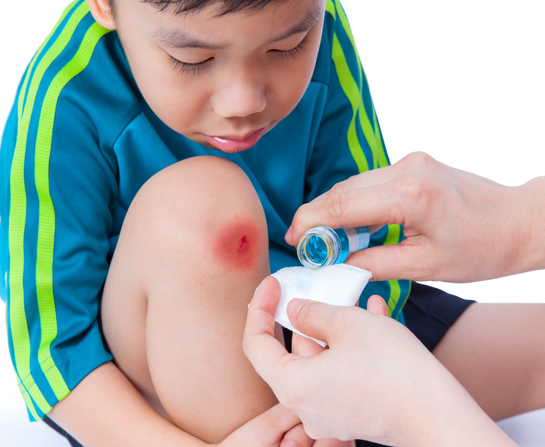Treat Your Injuries Quickly
April 28, 2022 Return

The first thing to do when you spot an injury – whether on yourself or your loved ones – is to stay calm. Being calm helps you think clearly and quickly as to the best way in treating the injury. It also helps if you keep a first aid kit within easy reach especially in places where injuries are common like the kitchen.
Treating a cut
If it’s a cut and it’s bleeding, first wash your hands with soap and water or use a hand sanitizer to clean your hands. Cover the cut with a clean gauze pad/cloth, and apply pressure for a few minutes to stop the bleeding.
Once the bleeding has stopped, wash the cut with cool, clean water. Examine the cut closely and carefully pick out any dirt or other material stuck on it (you can use a soft, damp cloth to help you do this). You can put a band-aid on the cut if you think it will be exposed to dirt or rub against your clothes. Otherwise, you can leave it uncovered as this helps it heal quickly. You can also spray the wound with dry powder spray containing povidone-iodine to prevent infection.
Treating a burn
Most burns are commonly caused by hot liquids like water or oil. For small burns like these, immediately run cool tap water over the burned area for 10 to 20 minutes. This will help to lower the temperature of the burn and its surrounding areas, preventing further damage.
Look at the burn closely and see if there are any cuts or other injuries. As the injured area may become swollen after a while, it’s best to remove any jewellery or clothing that can come into contact with the area.
Dry the injured area carefully with a clean, dry cloth and use a dry powder spray containing povidone-iodine to prevent infection.
See your doctor when …
- The injury is deep or wide
- The injury is caused by a dirty or rusty thing
- An animal or a person bites you
- You are unable to stop the bleeding
- You are unable to clean the injury properly
- The area around the injury becomes red and swollen
- You see pus coming out from the injury
- You have a fever.
References:
1. NetDoctor. Available at www.netdoctor.co.uk
2. WebMD. Available at www.webmd.com
If you like this article, do subscribe here.
